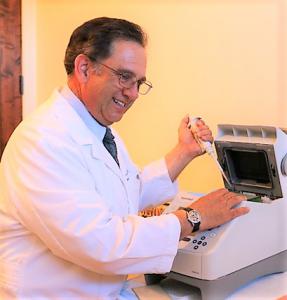Explanatory article about Scleroderma published by medical doctor and researcher William L. Matzner, MD
What is scleroderma? If you are looking for more information on this persistent skin disease, the new article by Dr. William Matzner explains it.
Healthcare Analytics, LLC (N/A:N/A)
Those people that begin to notice the signs and symptoms of scleroderma must visit their doctor immediately and get a consult. This skin disease can wreak havoc on a person’s life”
SIMI VALLEY, CALIFORNIA, UNITED STATES, June 5, 2019 /EINPresswire.com/ -- Scleroderma is a persistent skin disease which is very hard to treat entirely. The disease develops when the immune system faces problems, consequently causing the body to increase the production of the protein collagen, which is a primary skin component. Because of the increased collagen, the texture of the skin becomes tight and thick and triggers scarring on the kidneys and lungs. Other implications include the thickening of blood vessels and these blood vessels malfunctioning leading to tissue damage and hypertension.— Dr. William Matzner, California (Healthcare Analytics, LLC)
Dr. William Matzner has published a new article about this. The complete article will be published on the Blog of Dr. Matzner at https://drwilliammatzner.blogspot.com
Scleroderma is of two main types:
* Localized scleroderma
This category of the disease primarily affects the skin and branches into two further types:
1. Morphea: Where hard elongated patches start to appear on the skin’s surface
2. Linear scleroderma: When lines and streaks of condensed skin start appearing on the arms, legs, and the face.
* Systemic scleroderma
Also known as generalized scleroderma, it involves damaging parts of the body and the body’s systems. The two categories of this type of disease are:
1. Limited scleroderma: This version of the disease also affects the lungs, intestines and esophagus other than the hands, legs, and feet.
2. Diffuse scleroderma: This variation is when the skin starts thickening on the trunk, thighs, upper limbs, hands, and feet. This category of the disease also damages the internal organs, like the heart, lungs, kidneys, and gastrointestinal tract.
Causes
The exact cause of this disease is unknown. However, it has been successfully established that it is an autoimmune disease, implying that it develops when the immune system starts attacking the body instead of foreign objects and causes the skin and internal organs to be inflamed.
Symptoms
The main signs and symptoms of scleroderma are:
* The skin on the face and hands hardening and thickening
* Fingers and toes getting cold and turning blue or purple
* Blisters and swelling on the fingertips
* Small red spots on the face and chest
* Painful and swollen joints
* Mouth and eyes getting dry (Sjogren's syndrome)
* Shortness of breath
* Heartburn
* Diarrhea
* Unexplained weight loss
Diagnosis
Other than a physical examination based on the displayed signs and symptoms, physicians often carry out other diagnostic procedures as well. These include X-rays, blood tests and cultures, skin sampling and skin biopsy.
Treatment
As of now, this skin disease does not have a particular treatment or drug therapy. However, the symptoms can be managed and controlled for minimum inconvenience. This is usually achieved by prescribing:
* NSAIDs (non-steroidal anti-inflammatory medications such as ibuprofen or aspirin). These can help in reducing swelling and pain.
* Immune response controlling drugs like steroids that might help with pain in the muscles, joints, and other internal organ health issues.
* Blood boosting drugs that will increase blood flow to the fingers.
* Blood pressure stabilizing medication.
* Drugs that can widen respiratory blood vessels and prevent tissue scarring.
* Drugs that can relieve heartburn.
One medical publication notes that “[a]lthough there are, to date, no published trials of biologics or combination treatments, surveys of clinical practice demonstrate that tacrolimus, cyclophosphamide and a number of biologics (including tumour necrosis factor or interleukin-6 inhibitors) are being used in some patients for resistant or CNS [central nervous system] disease.” See Consensus-based recommendations for the management of juvenile localised scleroderma, https://ard.bmj.com/content/early/2019/03/01/annrheumdis-2018-214697
Lifestyle changes have also been reported to help a lot. Maintaining an active lifestyle by regularly exercising, eating a healthy and well-balanced diet, and undergoing physical therapy has also proved to be highly successful in keeping the swelling and pain at bay. Other treatments include skin treatments such as light and laser therapies, occupational therapy, and stress management therapy.
In case of severe organ damage, an organ transplant is suggested. Those people that begin to notice the signs and symptoms of scleroderma must visit their doctor immediately and get a consult. This skin disease can wreak havoc on a person’s life and can lead to major complications if left untreated.
About William Lee Matzner, M.D., PhD, FACP
Dr. William L. Matzner works in the area of healthcare economics consulting at Healthcare Analytics, LLC, in California. He graduated Phi Beta Kappa from Stanford University. He received his M.D. with Honors from Baylor College of Medicine. In 1988, he was the Solomon Scholar for Resident Research at Cedar Sinai Medical Center. Dr. Matzner subsequently was awarded a PhD in Neuro Economics from Claremont Graduate University. He is board certified in Internal Medicine and Palliative Medicine. He has researched and published extensively on the issue of reproduction and immunology in medical literature. He has been in private practice since 1989, specializing in Reproductive Immunology and Internal medicine.
Website: https://drwilliammatzner.com
Consulting Website: https://healthcareanalytics.biz
LinkedIn: https://www.linkedin.com/in/william-matzner-md-phd-mba-60219730
Blog: https://drwilliammatzner.blogspot.com
News: https://hype.news/dr-william-matzner/
News: https://hippocratesguild.com/dr-william-matzner
News: https://medicogazette.com/dr-william-matzner
Dr. William Matzner
Healthcare Analytics, LLC
+1 408-729-3232
email us here
Visit us on social media:
LinkedIn
Lee Health: Diagnosing Scleroderma. It’s an autoimmune disorder that can cause your skin to become tight and your joints to ache.





